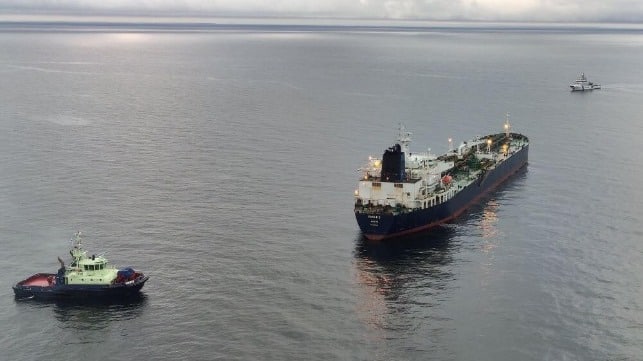Helsinki Court Rejects Release of “Dark Fleet” Tanker Eagle S

Legal proceedings regarding the “dark fleet” tanker Eagle S are heating up in Finland. The Helsinki District Court recently heard arguments concerning the release of the vessel. As the investigation unfolds, authorities have imposed a travel ban on eight crew members. This situation highlights the complexities surrounding maritime law and the implications of operating under questionable circumstances.
Court Proceedings and Legal Arguments
The Helsinki District Court rejected an appeal for the release of the Eagle S on Friday. A Finnish lawyer, representing the Cook Island-registered tanker and its operators, Caravella, argued for greater transparency in the case. He raised questions about the circumstances of the vessel’s seizure. The lawyer claimed that the tanker was in international waters when it was boarded by Finland’s National Bureau of Investigation (NBI) on December 28. He contended that the ship was initially directed to the Port of Kilpilahti before being moved to the Svartbeck inner anchorage near Porvoo.
Following the court’s decision, the lawyer announced plans to file another appeal for the tanker’s release. He emphasized that the ship is not owned by Russian interests but did not disclose the identity of the actual owners. The NBI is currently investigating the criminal case but has not provided further details on its status or timeline. The police have confirmed that the number of crew members under a travel ban has increased to eight, a measure that prevents them from leaving Finland. This travel ban is the least restrictive option under Finnish law, allowing authorities to continue their investigation without the risk of losing key witnesses.
Claims and Concerns from Telecom and Energy Firms
In addition to the ongoing criminal investigation, several telecom and energy companies have filed claims related to the Eagle S. Firms such as Elisa and the state-owned Cinia have demanded that the vessel remain impounded. They are joining forces with Finland’s national power grid operator, Fingrid, and Estonia’s grid operator, Elering, in seeking compensation for damages to their undersea cables. These claims underscore the broader implications of the tanker’s activities on critical infrastructure in the region.
Amid these developments, Finland’s Defense Committee held a closed-door meeting to discuss the situation. The committee chair expressed concerns about the potential environmental risks posed by aging tankers like the Eagle S. He acknowledged that the committee had been “naïve” in its previous assessments but maintained that the primary threat from the “dark fleet” lies in the possibility of a significant oil spill in the Gulf of Finland. The committee expressed satisfaction with the investigation’s progress and called for stricter measures to protect Finland’s underwater infrastructure. They urged the government to introduce new regulations to safeguard against future incidents, highlighting the need for vigilance in maritime operations.
